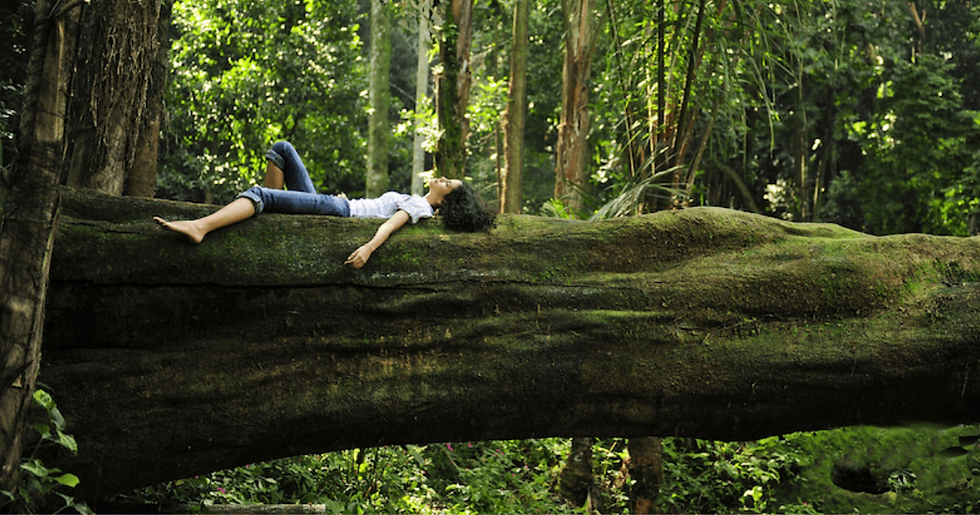The Healing Power of Forest Bathing: Nature's Impact on Mental Well-being
- Youth for Environment in Schools Organization YES-O
- Nov 27, 2023
- 3 min read
Updated: Nov 27, 2023
In the hustle and bustle of modern life, where screens and concrete dominate our surroundings, there is a growing recognition of the profound impact that nature, especially forests, can have on mental well-being. The concept of "forest bathing," rooted in ancient Japanese traditions, has gained popularity as a practice that goes beyond mere recreation, offering a holistic approach to improving mental health. In this exploration, we delve into the healing power of forest bathing and the ways in which spending time in nature contributes to enhanced mental well-being.
1. Shinrin-Yoku: The Art of Forest Bathing

Originating in Japan, "shinrin-yoku" translates to "forest bathing" or "taking in the atmosphere of the forest." It is not an intense physical activity but rather an immersive experience that involves mindfully connecting with nature. Forest bathing encourages individuals to engage all five senses, from the scent of pine trees to the sound of rustling leaves, fostering a deep and restorative connection with the natural world.
2. Stress Reduction and Cortisol Levels

Numerous studies have demonstrated the stress-reducing benefits of spending time in nature, particularly in forested environments. Forest bathing has been associated with lowered cortisol levels, the hormone associated with stress. The tranquil and immersive nature of forests creates an environment that promotes relaxation, reducing the physiological and psychological effects of chronic stress.
3. Improved Mood and Reduced Anxiety

Nature has a profound impact on mood, and forest bathing is no exception. Spending time in forests has been linked to increased feelings of happiness and reduced symptoms of anxiety. The presence of phytoncides, natural compounds released by trees, has been shown to contribute to these positive effects on mood and emotional well-being.
4. Enhanced Creativity and
Cognitive Function

Forest bathing has been found to enhance cognitive function and creativity. Time spent in nature, away from the demands of daily life, allows the mind to relax and engage in "soft fascination," a state associated with daydreaming and introspection. This mental state is conducive to creative thinking and problem-solving.
5. Immune System Boost

The exposure to phytoncides in forest air not only contributes to improved mood but also supports the immune system. Phytoncides have antimicrobial properties that may enhance the activity of natural killer (NK) cells, which play a crucial role in the body's defense against infections and cancer.
6. Mindfulness and Presence

Forest bathing is inherently a mindfulness practice. By immersing oneself in the sights, sounds, and sensations of the forest, individuals cultivate a sense of presence and awareness. This mindful connection with nature can act as a form of meditation, promoting mental clarity, and reducing the mental chatter associated with stress and anxiety.
7. Nature's Impact on Rumination

Rumination, the repetitive and intrusive focus on negative thoughts, is a common feature of various mental health conditions. Nature, and specifically forest environments, has been shown to interrupt the cycle of rumination. The tranquility and beauty of the natural world provide a positive distraction, redirecting attention away from negative thought patterns.
8. Social Connection and Community

Forest bathing can also be a social activity, fostering a sense of community and connection. Shared nature experiences contribute to the building of social bonds, reducing feelings of isolation and loneliness. Group forest bathing activities provide an opportunity for individuals to share in the restorative benefits of nature together.
9. Nature as a Therapeutic Environment

Nature is increasingly recognized as a therapeutic environment for mental health treatment. Ecotherapy, or nature-based therapy, incorporates outdoor activities, including forest bathing, into mental health interventions. Nature-based therapies have been shown to be effective in addressing conditions such as depression, anxiety, and stress.
10. Accessible Nature for Urban Dwellers

Even for those in urban environments, access to nature, including urban parks and green spaces, can offer mental health benefits akin to forest bathing. City planners and designers are increasingly prioritizing green infrastructure to provide residents with opportunities to connect with nature, promoting mental well-being in urban settings.
In conclusion, the healing power of forest bathing extends beyond a simple appreciation for nature; it represents a mindful and intentional immersion in the therapeutic essence of forests. Whether it's the calming effect of trees, the aromatic embrace of the forest, or the meditative sounds of nature, forest bathing provides a pathway to improved mental well-being. As individuals embrace the practice of forest bathing, they not only prioritize their mental health but also deepen their connection to the natural world, fostering a sense of balance and harmony in an increasingly fast-paced and digital society.





Comments